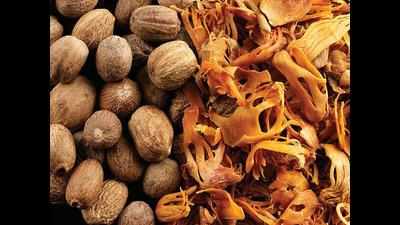Trending
This story is from June 28, 2022
Mace candy set to be Goa’s signature product

The process of preparing mace candy has already begun at two centres and will be marketed under the state’s brand, GoVan
PANAJI: While the cashewnut is already synonymous with Goa, mace candy is poised to become another of Goa’s signature products.
The fruit from which nutmeg is derived comprises of the rind called javetri (pericarp) and the kernel called jaiphal (nutmeg). While nutmeg is used widely, the pericarp often gets discarded by farmers, this even as 70% of the fruit comprises it.
In 2017, however, Goa-based ICAR-Central Coastal Agricultural Research Institute (CCARI) developed a process to make candy from this rind.
The process of preparing this candy has already begun at the two centres — Curchorem in South Goa and Pale-Kothambi in North Goa — established recently by the state government.
“We have purchased the process from ICAR-CCARI and we have already begun procurement of the rind to prepare the candy,” Goa State Biodiversity Board (GSBB) member secretary Pradip Sarmokadam said.
The GoVan brand was created by the state under the Goa State Biodiversity Board (GSBB) to produce products from locally derived natural ingredients.
The two processing centres are run entirely by local women and the idea was to preserve local biodiversity by helping generate livelihood opportunities through it.
After preparing jackfruit and mango cakes, pickles and candy, among other products, the board saw the perfect opportunity in ICAR-CCARI’s mace candy formula.
After several trials and experiments, the ICAR-CCARI developed the pericarp taffy, which can be incorporated into assorted dry fruits or used as one of the ingredients in a Christmas cake. The candy was developed with the aim of generating more income for horticulturists involved in nutmeg production.
The institute also expressed willingness to share its technology with those interested in taking it forward and developing a market for it. The ICAR-CCARI also provides training to entrepreneurs or self-help groups interested in capitalising on this.
The women at GoVan’s processing centres will now learn the process and prepare Goa’s next signature product.
At present, the pericarp is almost treated as a ‘waste product’ from which farmers would make compost.
The fruit from which nutmeg is derived comprises of the rind called javetri (pericarp) and the kernel called jaiphal (nutmeg). While nutmeg is used widely, the pericarp often gets discarded by farmers, this even as 70% of the fruit comprises it.
In 2017, however, Goa-based ICAR-Central Coastal Agricultural Research Institute (CCARI) developed a process to make candy from this rind.
The process of preparing this candy has already begun at the two centres — Curchorem in South Goa and Pale-Kothambi in North Goa — established recently by the state government.
The candy will shortly be available for retail sale as a product of the state’s own brand GoVan.
“We have purchased the process from ICAR-CCARI and we have already begun procurement of the rind to prepare the candy,” Goa State Biodiversity Board (GSBB) member secretary Pradip Sarmokadam said.
The GoVan brand was created by the state under the Goa State Biodiversity Board (GSBB) to produce products from locally derived natural ingredients.
The two processing centres are run entirely by local women and the idea was to preserve local biodiversity by helping generate livelihood opportunities through it.
After preparing jackfruit and mango cakes, pickles and candy, among other products, the board saw the perfect opportunity in ICAR-CCARI’s mace candy formula.
After several trials and experiments, the ICAR-CCARI developed the pericarp taffy, which can be incorporated into assorted dry fruits or used as one of the ingredients in a Christmas cake. The candy was developed with the aim of generating more income for horticulturists involved in nutmeg production.
The institute also expressed willingness to share its technology with those interested in taking it forward and developing a market for it. The ICAR-CCARI also provides training to entrepreneurs or self-help groups interested in capitalising on this.
The women at GoVan’s processing centres will now learn the process and prepare Goa’s next signature product.
At present, the pericarp is almost treated as a ‘waste product’ from which farmers would make compost.
End of Article
FOLLOW US ON SOCIAL MEDIA











